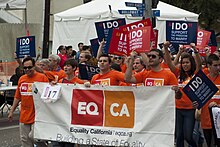
The Human Rights Campaign (HRC) is an American LGBTQ advocacy group. It is the largest LGBTQ political lobbying organization within the United States. Based in Washington, D.C., the organization focuses on protecting and expanding rights for LGBTQ individuals, including advocating for same-sex marriage, anti-discrimination and hate crimes legislation, and HIV/AIDS advocacy. The organization has a number of legislative initiatives as well as supporting resources for LGBTQ individuals.
The Log Cabin Republicans (LCR) is an organization affiliated with the Republican Party which works to educate the LGBT+ community and Republicans about each other.

The rights of lesbian, gay, bisexual, transgender, and queer (LGBTQ) people in the United States are among the most advanced in the world, with public opinion and jurisprudence changing significantly since the late 1980s.

Mark Leno is an American politician who served consecutively in both houses of the California State Legislature from 2002 to 2016. A Democrat, he represented the 11th Senate district, which includes San Francisco and portions of San Mateo County, from 2012 to 2016. Until the 2010 redistricting came into effect, he represented the 3rd Senate district (2008–2012). Prior to being elected to the State Senate in 2008, Leno served in the California State Assembly, representing the 13th district.
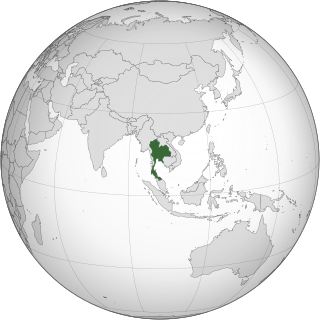
The rights of lesbian, gay, bisexual, transgender, and queer (LGBTQ) people in Thailand are regarded as some of the most comprehensive of those in Asia. Both male and female same-sex sexual activity are legal. Same-sex marriage was signed into law in 2024, and will come into force in January 2025. Thailand was the first Asian UN member state to pass a comprehensive same-sex marriage law, as well as the first in Southeast Asia and the 37th in the world. About eight percent of the Thai population, five million people, are thought to be in the LGBT demographic.

Lesbian, gay, bisexual, transgender, and queer (LGBTQ) rights in Argentina rank among the highest in the world. Upon legalising same-sex marriage on 15 July 2010, Argentina became the first country in Latin America, the second in the Americas, and the tenth in the world to do so. Following Argentina's transition to a democracy in 1983, its laws have become more inclusive and accepting of LGBT people, as has public opinion.
The California Legislative LGBTQ Caucus is an American political organization formed in June 2002 and composed of openly lesbian, gay, bisexual and transgender members of the California State Legislature. The caucus currently has 14 members, a record high.
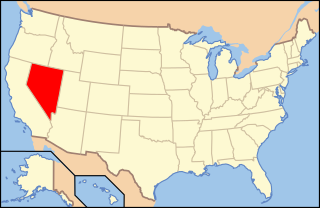
Lesbian, gay, bisexual, transgender, and queer (LGBTQ) people in the U.S. state of Nevada enjoy the same rights as non-LGBTQ people. Same-sex marriage has been legal since October 8, 2014, due to the federal Ninth Circuit Court of Appeals ruling in Sevcik v. Sandoval. Same-sex couples may also enter a domestic partnership status that provides many of the same rights and responsibilities as marriage. However, domestic partners lack the same rights to medical coverage as their married counterparts and their parental rights are not as well defined. Same-sex couples are also allowed to adopt children. Since 2022 the Nevada Constitution explicitly includes both sexual orientation and gender identity - discrimination laws since 1999 included sexual orientation for employment and expanded thereafter to housing and accommodation. In addition, conversion therapy on minors is outlawed in the state.
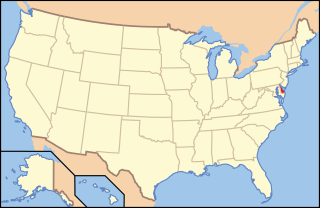
Lesbian, gay, bisexual, transgender, and queer (LGBTQ) people in the U.S. state of Delaware enjoy the same legal protections as non-LGBTQ people. Same-sex sexual activity has been legal in Delaware since January 1, 1973. On January 1, 2012, civil unions became available to same-sex couples, granting them the "rights, benefits, protections, and responsibilities" of married persons. Delaware legalized same-sex marriage on July 1, 2013.
Marriage Equality California is the now defunct California chapter of Marriage Equality USA. Founded in 1999, MECA was the grassroots organization fighting to secure the legal recognition of same-sex marriage through education and outreach in California. Its mission statement is to secure the freedom and the right of same-sex couples to enter into legally recognized civil marriage, having all the federal and state benefits and responsibilities which that entails. Marriage Equality California merged with Equality California in 2004. Most of the work performed by Marriage Equality California is now performed as a local project of its original parent organization Marriage Equality USA.

EqualityMaine is Maine's oldest and largest lesbian, gay, bisexual, and transgender political advocacy organization. Their mission, outlined on the organization's website is to "secure equality for lesbian, gay, bisexual, and transgender people in Maine through political action, community organizing, education, and collaboration."
The history of LGBT residents in California, which includes centuries prior to the 20th, has become increasingly visible recently with the successes of the LGBT rights movement. In spite of the strong development of early LGBT villages in the state, pro-LGBT activists in California have campaigned against nearly 170 years of especially harsh prosecutions and punishments toward gays, lesbians, bisexuals, and transgender people.
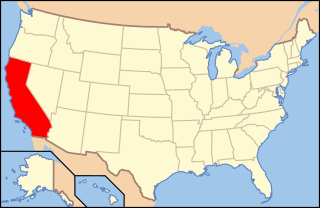
California is seen as one of the most liberal states in the U.S. in regard to lesbian, gay, bisexual, transgender, and queer (LGBTQ) rights, which have received nationwide recognition since the 1970s. Same-sex sexual activity has been legal in the state since 1976. Discrimination protections regarding sexual orientation and gender identity or expression were adopted statewide in 2003. Transgender people are also permitted to change their legal gender on official documents without any medical interventions, and mental health providers are prohibited from engaging in conversion therapy on minors.

LGBTQ history in the United States consists of the contributions and struggles of lesbian, gay, bisexual, transgender and queer (LGBTQ) people, as well as the LGBTQ social movements they have built.
Fair, Accurate, Inclusive, and Respectful Education Act, also known as the FAIR Education Act and informally described by media outlets as the LGBT History Bill, is a California law which compels the inclusion of the political, economic, and social contributions of persons with disabilities and lesbian, gay, bisexual, and transgender people into educational textbooks and the social studies curricula in California public schools by amending the California Education Code. It also revises the previous designation of "black Americans, American Indians, Mexicans, Asians, [and] Pacific Island people" into a list considered Indigenous peoples of the Americas. It would also amend an existing law by adding sexual orientation and religion into a list of characteristics that schools are prohibited from sponsoring negative activities about or teaching students about in an adverse way.
This is a list of notable events in the history of LGBTQ rights that took place in the year 2017.
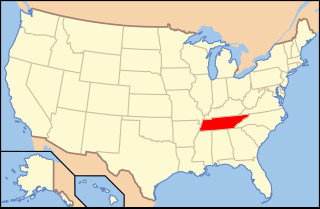
The Tennessee Transgender Political Coalition is a transgender and LGBTQ civil rights organization in the state of Tennessee in the United States of America.

Arnold Schwarzenegger was an early opponent of same-sex marriage in the United States, including during his Governorship of California. As an elected official he opposed legal recognition of same-sex marriage but otherwise he supported LGBT rights legislation, including civil unions.

Rick Chavez Zbur is an American attorney currently serving in the California State Assembly.


